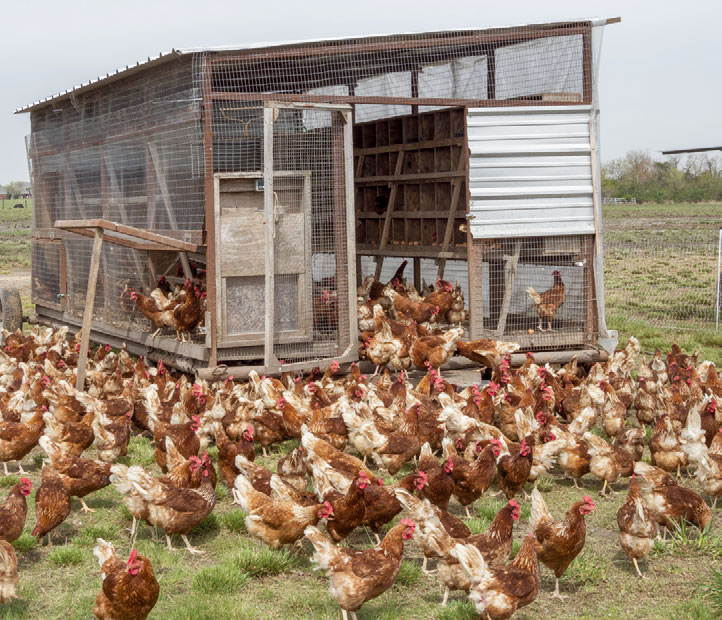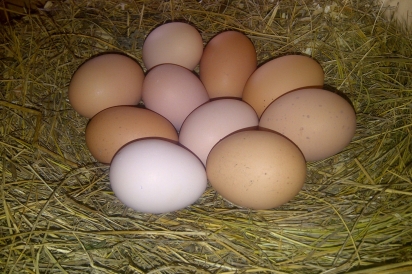Kenz Henz: Pastured Eggs to Supermarket
Happy “Girls”
Ken Adams of Kenz Henz in Santa Fe, a city in Galveston County, describes the nature of his egg business as either feast or famine. “I tell my wife, ‘We’re either going to have too many eggs or not enough eggs,’” says Adams. “Chickens don’t just lay; they don’t just say, ‘OK, Kenz Henz, I’m a chicken and I’m going to give you six eggs in a row, skip a day, for a year.”
Instead, pastured hens go through cycles. In extreme cold, the food they consume is used to produce energy and warmth instead of eggs, so production drops. They’ll start laying more eggs in the spring before phasing into summer, which Adams calls the worse time of year for his flock. The birds can’t get enough water, they pant and perspire and are generally hot and unhappy, which means they’re not producing a lot of eggs.
“It’s a cycle you have to learn when you do pastured hens,” said Adams. Unlike conventional hens that are kept in environments where the climate and light can be controlled, pastured hens are exposed to natural influences out of the farmer’s control.
A youth sports coach for nearly 40 years, Adams started raising chickens as a hobby that he began devoting more time to when he left sports. “It’s a hobby that went awry,” he says.
When he had more eggs than his family could eat, he started giving them to neighbors. Soon, people wanted to buy them, so he bought more chickens and started selling at farmers markets in Houston’s surrounding areas. In 2015, at the suggestion of his customers, he started selling his eggs to Arlan’s Market, a familyowned grocery store business based in Seabrook. Today Adams sells about 70,000 eggs per week to about 30 HEBs, a dozen Krogers and some specialty stores.
Adams no longer sells at farmers markets because he doesn’t have the resources to do so. But he still has a relationship with his customers, many of whom let him know via text or phone when they can’t find his eggs at their local stores. When asked how he maintains quality and sustainable practices as he grows, Adams has a simple answer: “We just maintain what we’re doing at the same scale and try to do better.”
An important part of his business is educating people about eggs. There is a lot of confusion about what egg labels such as “cage-free,” “free-range” and “pastured” really mean. Cage-free, for instance, means that chickens aren’t kept in cages but they can still be confined inside a building in a two-by-two-foot square without ever seeing the light of day. Buying them only supports the poor treatment of the animals.
“A lot of people just don’t realize what caged birds live through,” says Adams. “It’s hostile. No animal should have to do that to satisfy a human need.”
Adams’s 14,000 Hyline Brown hens live on 250 acres. The girls, as he refers to them, live in houses that he moves every seven to 10 days. Whenever the houses are moved to new pastures, the chickens get what Adams calls new salad bars: access to fresh grasses, bugs, weeds and flowers. It’s what he credits for the better flavor, creamier texture and quality of his eggs. Plus, moving the houses isn’t only good for the chickens. It also helps the land, which gets richer and healthier as the chickens cycle through it. Adams supplements the birds’ pasture diet with vegetarian feed and treats them as naturally as possible when they get sick—which isn’t often. He also genuinely enjoys being around them.
Says Adams, “When you take them and move them to a brand new pasture and open their door and listen to them coming out of the house, they know that they’re on a new pasture and they are happy. You can hear all different types of pitches in their voices; they’re talking to each other, they hit the ground, they’re running, they’re eating grasses. You can’t imagine what it does to your heart when you see the girls that happy.”
Despite their different business models, something chicken farms Renaissance Chicken and Kenz Henz have in common is farmers who truly care about giving their birds a healthy, happy life. The proof is in the egg.







